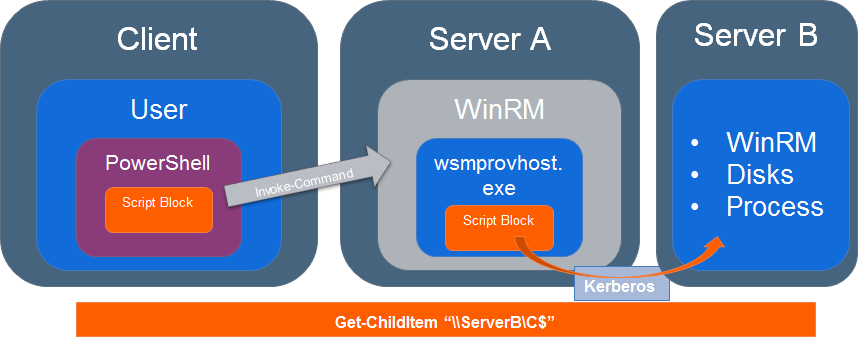您遇到了一个称为双跳问题。在本质上,您要求远程会话使用相同的Windows身份验证访问另一个外部资源。
由于安全原因,Microsoft默认情况下不允许这种情况。

如果您想了解更多关于它,请阅读我的整个后PowerShell remoting caveats
的解决方案是不容易的,definetely不是唯一的,因为它主要有Kerberos身份验证以及如何做域控制器想要控制这个。例如,域控制器可以指定两台服务器之间允许使用特定的双跳,否则您必须允许每台服务器使用双跳。
更好的解决方案是使用域配置,但您需要联系您的域管理员并说服他。
我将通过脚本参考显示如何为每个服务器执行此操作。例如从上面的图片中,我们必须配置ServerA以允许将凭证委托给ServerB。
我必须解决这些问题,我已经构建了一个自动化存储库。自动化名称为ISHBootstrap,我将参考此存储库中的脚本。并非一切都适合这里。请记住,所有脚本都可以在本地或远程执行,这就是为什么您会注意到使用包装程序cmdlet的原因:Invoke-CommandInvoke-CommandWrap。只需查看受尊重的脚本块并提取代码即可。
首先,我们需要在ServerA上安装一些前提条件。
我使用这个脚本Install-WinRMPrerequisites.ps1,但它是作为此命令
Get-WindowsFeature |Where-Object -Property Name -EQ "WinRM-IIS-Ext"|Add-WindowsFeature
然后,我们需要启用和配置WSManCredSSP一样简单。这需要一个安全的远程会话,这就是为什么我们需要通过SSL设置winrm。此脚本运行整个过程Enable-WSManCredSSP.ps1
- 启用WSManCredSSP。
- 安装自签名证书并使用安全端点配置WSMan。
- 重新启动WSMan。
- 打开防火墙端口。
下面是从脚本中提取出代码:
#region Enable WSManCredSSP
Enable-WSManCredSSP -Role Server -Force | Out-Null
#endregion
#region Configure a secure WinRMListener
$winRmListeners=& winrm enumerate winrm/config/listener
$httpsLine= $winRmListeners -match "HTTPS"
Write-Debug "httpsLine=$httpsLine"
if(-not $httpsLine)
{
$certificate=Get-ChildItem -Path Cert:\LocalMachine\My |Where-Object -Property Thumbprint -EQ $Thumbprint
$hostname=(($certificate.Subject -split ', ')[0] -split '=')[1]
Write-Debug "Adding winrm https listener"
& winrm create winrm/config/Listener?Address=*+Transport=HTTPS "@{Hostname=""$hostname"";CertificateThumbprint=""$Thumbprint""}"
Write-Verbose "Added winrm https listener"
Write-Debug "Configuring ACL"
# Specify the user, the permissions and the permission type
$permission = "NETWORK SERVICE","Read,FullControl","Allow"
$accessRule = New-Object -TypeName System.Security.AccessControl.FileSystemAccessRule -ArgumentList $permission;
$keyPath = $env:ProgramData + "\Microsoft\Crypto\RSA\MachineKeys\";
$keyName = $certificate.PrivateKey.CspKeyContainerInfo.UniqueKeyContainerName;
$keyFullPath = Join-Path $keyPath $keyName;
# Get the current acl of the private key
# This is the line that fails!
$acl = Get-Acl -Path $keyFullPath;
# Add the new ace to the acl of the private key
$acl.AddAccessRule($accessRule);
# Write back the new acl
Set-Acl -Path $keyFullPath -AclObject $acl;
Write-Verbose "Configured ACL"
}
else
{
Write-Warning "winrm https listener detected. Skipped"
}
#endregion
#region restart WinRm service
Write-Debug "Restarting winrm service"
Get-Service -Name WinRM |Restart-Service| Out-Null
while((Get-Service -Name WinRM).Status -ne "Running")
{
Start-Sleep -Milliseconds 500
}
Write-Verbose "Restarted WINRM service"
#endregion
#region Configure windows firewall
$ruleName="WinRM-HTTPS"
$rulePort=5986
Write-Debug "Querying if firewall port for winrm https is open"
if(-not (Get-NetFirewallRule|Where-Object {($_.DisplayName -eq $ruleName) -and ($_.Direction -eq "Inbound")}))
{
Write-Verbose "Adding firewall port for winrm https is open"
New-NetFirewallRule -DisplayName $ruleName -Direction Inbound -Action Allow -Protocol "TCP" -LocalPort $rulePort|Out-Null
}
Write-Host "Winrm https firewall port is ok"
#endregion
此时ServerA准备好您的授权委托给另一台服务器,但客户仍然需要明确指出的是,远程会话必须能够做到这一点。使用CredSSP认证类型时这样
$session=New-PSSession -ComputerName $Computer -Credential $Credential -UseSSL -Authentication Credssp
公告创建一个会话两个重要的事情:
-Credentials必须明确指定,即使他们是为登录同一用户。- 使用
-UseSSL使用winrm安全。
现在使用$session与你原来的代码,它应该工作
Invoke-Command -ComputerName $vms -Session $session -ScriptBlock {
Import-Certificate `
-FilePath \\dc1\CertificateShare\17C37D0A655B89967398C9E7E8185F78541B1589.cer `
-CertStoreLocation 'Cert:\LocalMachine\Root'
}

- 固定双跃点身份验证问题“*什么是需要克服这个错误*?”;可能重复的[Powershell服务器网络驱动器](https://stackoverflow.com/questions/24903878/powershell-server-network-drive) – TessellatingHeckler